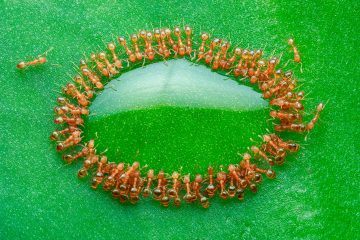Elizabeth Preston in The New York Times:
 Are humans the only animals that caucus? As the early 2020 presidential election season suggests, there are probably more natural and efficient ways to make a group choice. But we’re certainly not the only animals on Earth that vote. We’re not even the only primates that primary. Any animal living in a group needs to make decisions as a group, too. Even when they don’t agree with their companions, animals rely on one another for protection or help finding food. So they have to find ways to reach consensus about what the group should do next, or where it should live. While they may not conduct continent-spanning electoral contests like this coming Super Tuesday, species ranging from primates all the way to insects have methods for finding agreement that are surprisingly democratic. As meerkats start each day, they emerge from their burrows into the sunlight, then begin searching for food. Each meerkat forages for itself, digging in the dirt for bugs and other morsels, but they travel in loose groups, each animal up to about 30 feet from its neighbors, says Marta Manser, an animal-behavior scientist at the University of Zurich in Switzerland. Nonetheless, the meerkats move as one unit, drifting across the desert while they search and munch.
Are humans the only animals that caucus? As the early 2020 presidential election season suggests, there are probably more natural and efficient ways to make a group choice. But we’re certainly not the only animals on Earth that vote. We’re not even the only primates that primary. Any animal living in a group needs to make decisions as a group, too. Even when they don’t agree with their companions, animals rely on one another for protection or help finding food. So they have to find ways to reach consensus about what the group should do next, or where it should live. While they may not conduct continent-spanning electoral contests like this coming Super Tuesday, species ranging from primates all the way to insects have methods for finding agreement that are surprisingly democratic. As meerkats start each day, they emerge from their burrows into the sunlight, then begin searching for food. Each meerkat forages for itself, digging in the dirt for bugs and other morsels, but they travel in loose groups, each animal up to about 30 feet from its neighbors, says Marta Manser, an animal-behavior scientist at the University of Zurich in Switzerland. Nonetheless, the meerkats move as one unit, drifting across the desert while they search and munch.
The meerkats call to one another as they travel. One of their sounds is a gentle mew that researchers have called a “move call.” It seems to mean, “I’m about ready to move on from this dirt patch. Who’s with me?” In a 2010 study, Dr. Manser and her colleagues studied move calls in a dozen meerkat groups living in the Kalahari Desert in South Africa. Groups ranged from six to 19 individuals. But the scientists found that only about three group members had to mew before the whole party decided to move along. The group didn’t change direction, but it would double its speed to reach better foraging grounds.
Biologists call this phenomenon — when animals change their behavior in response to a critical mass of their peers doing something — a quorum response. Dr. Manser thinks quorum responses show up in human decision making, too.
More here.
